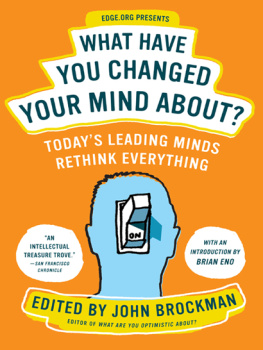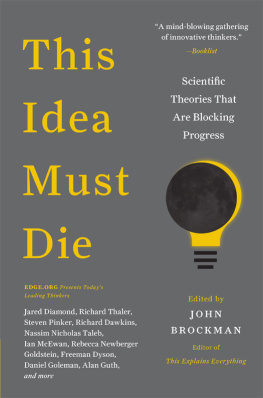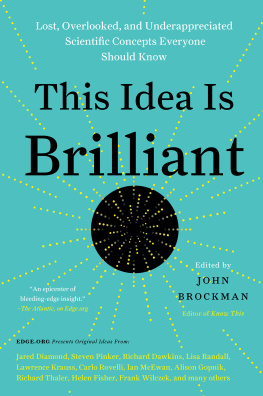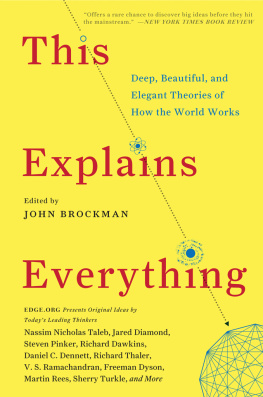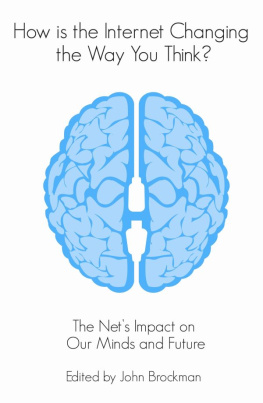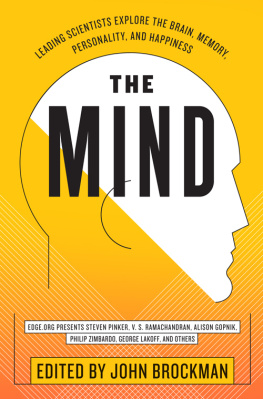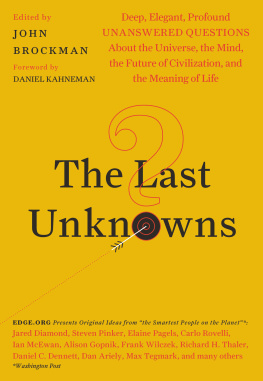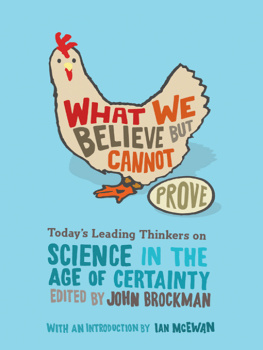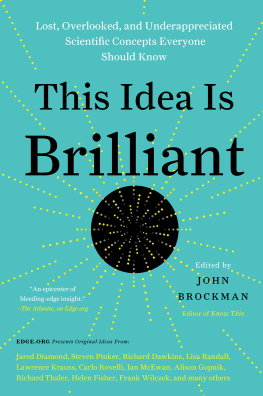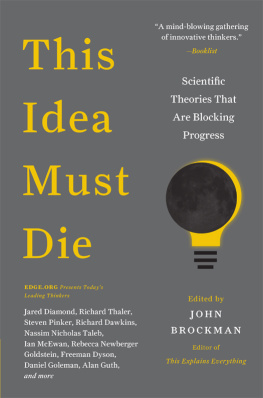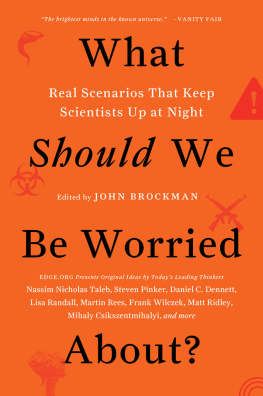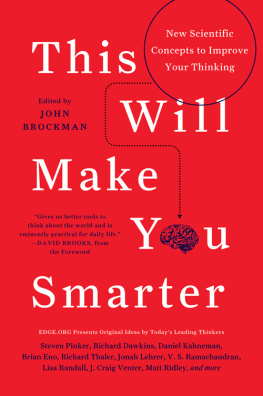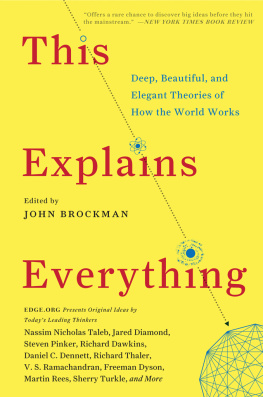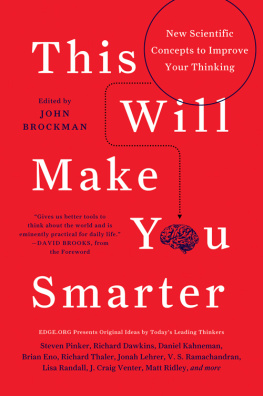Contents
The Edge Question
by Brian Eno
The biggest thing Ive changed my mind about is climate change. I was a climate skeptic and now Im a carbon zealot. I seem to annoy traditional environmentalists just as much, but I like to think that Ive moved from behind to in front
I have changed my mind about the general validity of the mechanical worldview that underlies the modern scientific understanding of natural processes.
Like many people, I onceimagined there were real boundaries between the natural and the artificial, between one species and another, and thought that with the advent of genetic engineering we would be tinkering with life at our peril. I now believe that this romantic view of nature is a stultifying and dangerous mythology.
It long seemed to me that Poppers falsifiability test was basically right and enormously useful. But then I started to read Poppers work carefullyand to look to scientific practice to see whether his theory survives the test of falsifiability. And Ive changed my mind.
When reporters interviewed me in the 1970s and 80s about the possibilities for Artificial Intelligence I would always say that we would have machines as smart as we are within my lifetime. I no longer believe that will happen.
Ive changed my mind about how to handle the homunculus temptation: the almost irresistible urge to install a little man in the brain to be the Boss, the Central Meaner, the Enjoyer of pleasures, and the Sufferer of pains.
Perhaps there were no paranormal phenomena at all. As far as I can remember, this scary thought took some time to sink in.
Just suppose that the Cartesian theater of consciousness, about which modern philosophers are generally so skeptical, is in fact a biological reality.
I have changed my mind about the relevance of neuroscience to philosophers questions, and vice versa.
I stopped believing in God long ago, but he still casts a long shadow.
We need to keep our minds open, or at least ajar, to the possibility that humans themselves could change drastically within a few centuries.
I wont claim I believe the universe is finite, just that I recognize that a finite universe is a realistic possibility for our cosmos.
Like many scientists in the field of memory, I used to think that a memory is something stored in the brain and accessed when used.
In recent years, we have seen clear signs that while the Net may be a decentralized communications system, its technical and commercial workings actually promote the centralization of power and control.
I thought the Internet would change people.
I started to doubt unification, finding it to be the scientific equivalent of a monotheistic formulation of reality, a search for God revealed in equations.
I changed my mind about an important historical question: Did the nuclear bombings of Hiroshima and Nagasaki bring World War II to an end?
I have come to question the key assumption behind this Edge survey: When facts change your mind, thats science. This idea that science is an objective fact-driven pursuit is laudable, seductive, andalasa mirage.
Rank-and-file biologists are rarely asked to consider the key ethical questions around which [animal-research] policies are based.
Ive come to reject the common SETI (search for extraterrestrial intelligence) wisdom that there must be millions of technology-capable civilizations within our light sphere (the region of the universe accessible to us by electromagnetic communication).
Icame to believe that we can in fact create humanlike computer programs.
I used to think you could predict the future.
Since I started my life knowing virtually nothing, I have changed my mind about virtually everything.
The discovery of dark energy has radically changed our view of the universe.
I have never questioned the conventional view that a good grounding in the physical sciences is needed for a deep understanding of the biological sciences. It did not occur to me that the opposite view might also be true.
The genetic differences among us reveal a species with a propensity to form small and relatively isolated groups on which natural selection has often acted strongly to promote genetic adaptations to particular environments.
I used to pride myself on the fact that I could explain almost anything to anyone, on a simple enough level, using analogies.
I have come to realize that the bulk of my scholarly career has been a critique of the principal claims that Piaget put forth.
I now think that perception is useful because it is not veridical.
Ive begun to rethink the way we teach students to engage in scientific research.
Hypothesis testing is a powerful means of rejecting errorof trimming the dead limbs from the scientific treebut it does not generate hypotheses or signify which are worthy of test.
I used to think that a modern, democratic society had to be a scientific society.
Where once I would have striven to see Incan child sacrifice in their terms, I am increasingly committed to seeing it in ours.
I am driven to the ultimately wise advice of my Columbia mentor, I. I. Rabi, whourged his students to run for public office and get elected. Then, we thought the old man was bonkers. But today
I now understood that we candraw fundamental insights about our present minds through reflecting on the environmental problems and opportunities that have exerted selective pressure on our Paleolithic ancestors.
Are there forms of subjective experience which, in a strictly normative sense, are better than others?
In recent years I have made less use of Darwins adaptive logic.
I have come to believe that an individual consciousness represents an entity so personal and ontologically unique that it qualifies as something we might as well call a soul.
I now see mathematics asthe creation of the (collective) human mind.
I believed at one time that culture and language were largely independent. Yet there is a growing body of research that suggests the opposite: Deep reflexes from culture are to be found in grammar.
I was wrong to accept the idea that language is separate from the rest of the human mind.
I used to believe that computers were on the right track, but now I think the right thing to do is to move forward from our 1950s models to a ground-up, fundamentally distributed computing architecture.
Although understanding the detailed nature of human consciousness is a fascinating challenge in its own right, it is not necessary for a fundamental theory of physics, which need only derive the consensus view from its equations.
The most interesting and important things in the life sciences are not going to be explained with sheer reductionism.
I have changed my mind about my body. I used to think of it as a kind of hardware on which my mental and behavioral software was running. Now I think of my body primarily as software.
Humans have probably inherited a tendency to love and love again in order to create more genetic variety in the young.
When youre trying to put together a theory of broad sweep, it may be difficult, if not impossible, to keep an open mind; you may be well beyond that stage, having long since cast your lot with a particular line of reasoning.
What created the structure of the universe? Most cosmologists would say the answer is inflation, and until recently I would have been among them.

